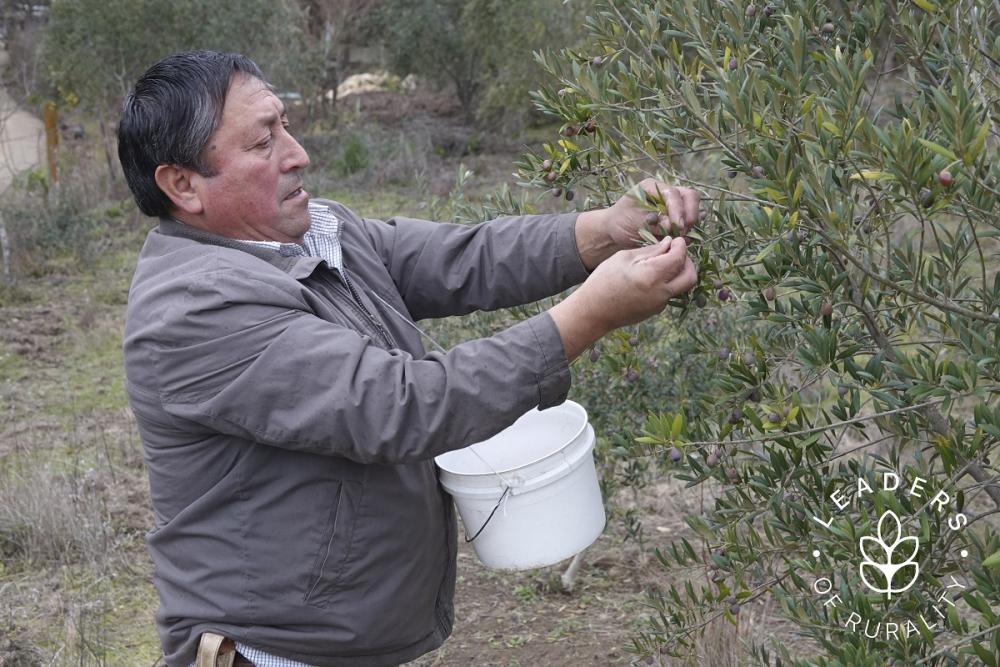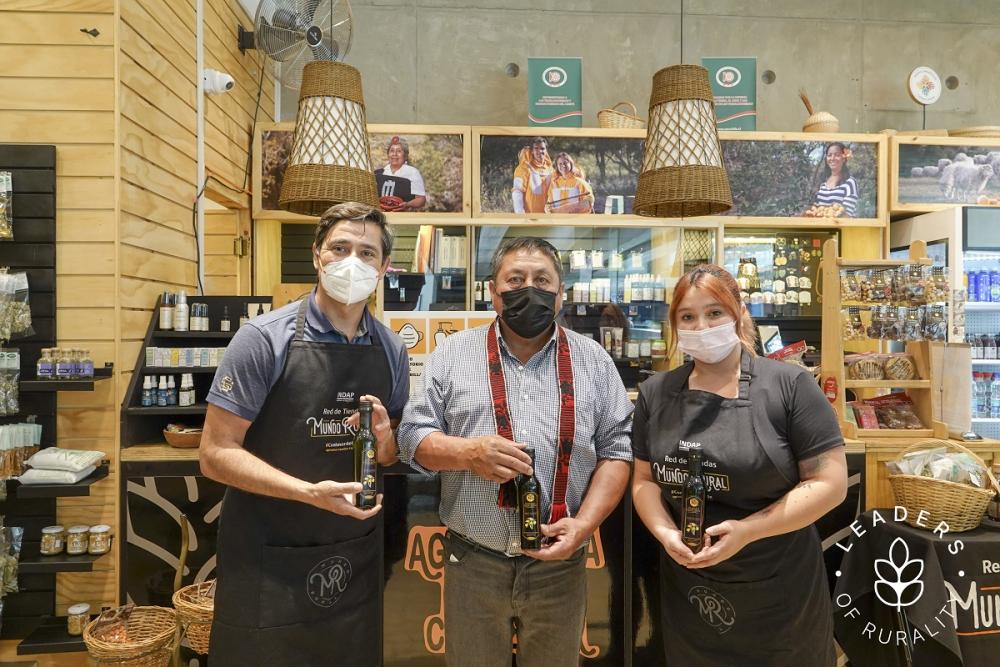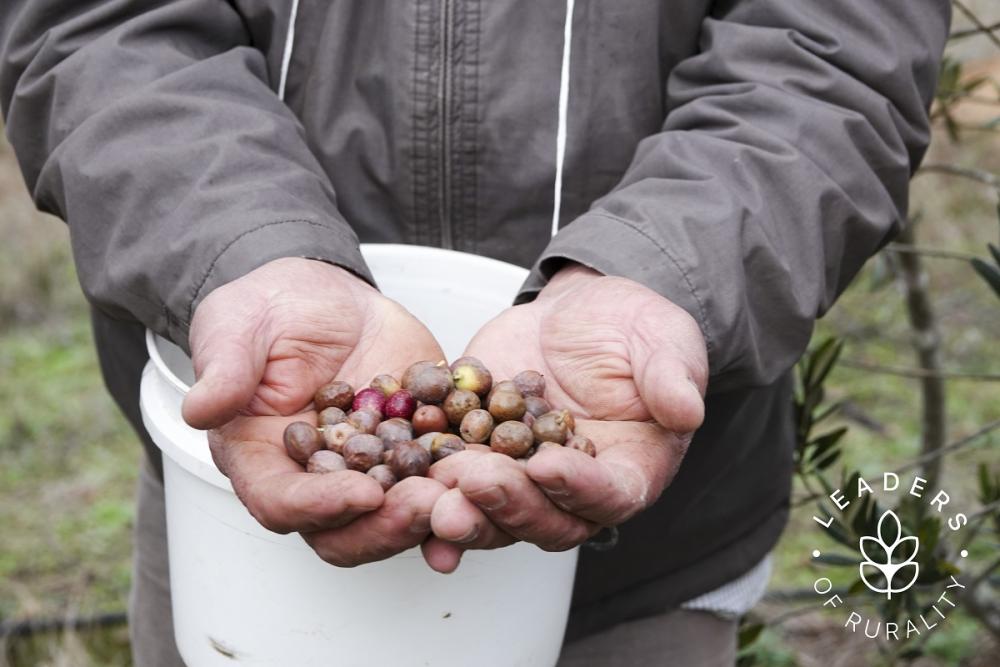Sepúlveda and his wife, kids, brother and cousins produce an olive oil whose quality has been highlighted by experts in an area that had never before produced this product.

San José, 18 April 2022 (IICA) –The Chilean family farmer and member of the Mapuche people, Emilio Sepúlveda,was declared “Leader of Rurality in the Americas” by the Inter-American Institute for Cooperation on Agriculture (IICA).
The “Soul of Rurality” award recognizes his life’s work promoting healthy and nutritious food production and his willingness to innovate and take on new projects as demonstrated by his current olive oil production, which experts have rated as world class.
IICA recognizes Leaders of Rurality in the Americas in order to reward and bring visibility to those who play the irreplaceable dual role of being the guarantors of food and nutritional security, while at the same time being guardians of the planet’s biodiversity through production in any circumstances. These are men and women leaving their mark and making a difference in the rural areas of Latin America and the Caribbean.
His passion for agriculture leaves a positive example for rurality in the region. Sepúlveda became interested in olive plants that were traditionally grown in northern Chile, and brought the activity to Araucanía, one of the 16 regions of the country located more than 700 kilometers south of the capital, Santiago.
He dreams of taking his olive oil to international markets and of leaving his legacy of passion for agriculture to his children and to the new generations in general. IICA considers agriculture to be an instrument for peace and the integration of all peoples, and is working alongside its 34 Delegations in the Americas to select the #LeadersofRurality.
Emilio Sepúlveda, the Araucanía farmer who gave life to the southernmost olive oil
Emilio Sepúlveda has spent his entire life in the country. Since before he could even remember, he learned to cultivate the land and to raise animals in Araucanía, the region in Chile located some 700 kilometers south of the capital, Santiago. That is his mark of identity, in addition to belonging to the Mapuche people, the largest Indigenous ethnic group in this country in South America.
“I am certain that I would not be able to live without greenery, the fresh air and fresh food that we have in the countryside. I think that in the city I would die after just a short while. Here, I work every day for a living and to leave a better tomorrow for those who will come after me. If I don’t plant things, I have no hope”, says Emilio, proud family farmer and advocate of South American Indigenous culture.
Today, in his five-hectare property located in the Los Sauces community, Sepúlveda and his wife, kids, brother and cousins produce an olive oil whose quality has been highlighted by experts in an area that had never before produced this product.

“As a family we were really drawn to the olive groves in northern Chile”, he recalls. “About six years ago we decided to start growing them here to make the southernmost olive oil in the world, which is now the pride of the Mapuche people. From here to the south there are no more olive trees. To us, olive trees mean peace and harmony; first among ourselves and then with others. I am convinced that race should not divide us because we are all human beings”, says Sepúlveda.
His project is still small but already bearing fruit, despite the water crisis affecting the country as well as the impact on the watercourse levels in Araucanía, hindering agricultural activity.
Today, this farmer already has around 500 olive plants, does the grinding and pressing work to obtain the oil and dreams of producing higher and higher quality olive oil to compete in the market with the large producers in the north of the country, who have hundreds of hectares.
However, Sepúlveda’s passion doesn’t end with olive oil. He also grows wheat and oats, and has a garden where he grows strawberries, raises pigs and poultry and, as if that weren’t enough, he has bees for producing honey.
He has achieved all of this thanks to his great interest in training since his family participated in a pilot program with the Chilean National Rural Development Policy, which was launched to promote associativity and the arrival of investments in productive activities in the Araucanía Region. This project from the Chilean Ministry of Agriculture is designed to improve the living conditions of rural communities.
In addition, Emilio especially appreciates the technical support from the Chilean Agricultural Development Institute (INDAP) and the Inter-American Institute for Cooperation on Agriculture (IICA) that enabled him to have his olive oil finished and ready for sale.
When asked about his projects, Emilio gets excited and responds that he would like to export because he has modernized his work and feels ready to reach the most demanding international markets with his olive oil. However, he is aware that the most important thing is not a client in some distant part of the planet, but rather to transmit his legacy of passion for rural work.
“My dream is to leave the olive trees for future generations”, he says. “We are always thinking about the future because someday we are going to leave, but we must teach our children. What I dream about is leaving them wisdom; I don’t want to leave them money because if I do, they will fight amongst themselves. I would rather them have intelligence and education so they can handle new technologies well and so that the future will be theirs. If we leave them education, they are not going to have to leave for the cities; they will stay in the countryside. And that is what we want: we want our families and neighbors to be able to live better every day where we were born, that they take care of the land and value the Mapuche people”.

A story of resilience
Emilio learned rural work when he was a child, alongside his grandmother who was a farmer and supported her family by growing vegetables in the garden and raising lambs. None of his grandparents had access to formal education and both led lives marked by sacrifice, just like Emilio’s mother.
“I was born in the countryside”, he says, “and I still live there. I am the son of a single mother and I suffered a lot as a child. We lived in a little clay house and we slept in straw-filled sacks. Happily, and thank God, I was able to get out of poverty. First, I worked splitting firewood, plowing with animals, making charcoal or digging wells for the neighbors. Later, I learned to build houses and also to do electrical and mechanical work. Here in the country we have to do everything and I learned it all by watching. Many farmers in my area emigrated to the cities, in search of a life of less sacrifice, but I wouldn’t trade it for anything: working in the fields is the most beautiful thing there is. Here we are brave enough to endure the cold or the heat. My life is here.”
Emilio has two daughters and a son, who he has always given the same advice to: a farmer must worship effort and perseverance and must never give up. He has never told them that things in the countryside are easy because rural work doesn’t allow for days of rest that are typical in the city. “The poultry, the pigs, and all the rest of the animals must be fed every day”, says this Mapuche farmer, who never tires of repeating what is, for him, the only secret of rural life: always go to bed late and get up early.
More information:
Institutional Communication Division.
comunicacion.institucional@iica.int
Photo gallery











